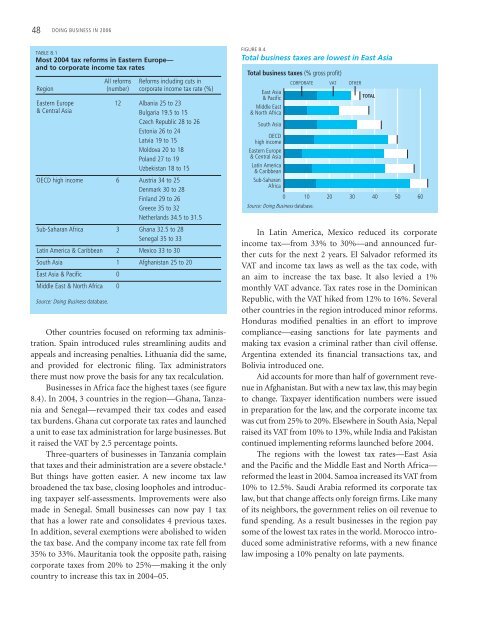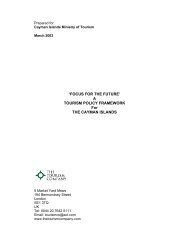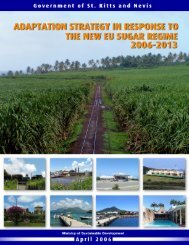Creating
Doing Business in 2006 -- Creating Jobs - Caribbean Elections
Doing Business in 2006 -- Creating Jobs - Caribbean Elections
Create successful ePaper yourself
Turn your PDF publications into a flip-book with our unique Google optimized e-Paper software.
48 DOING BUSINESS IN 2006<br />
TABLE 8.1<br />
Most 2004 tax reforms in Eastern Europe—<br />
and to corporate income tax rates<br />
All reforms Reforms including cuts in<br />
Region (number) corporate income tax rate (%)<br />
Eastern Europe 12 Albania 25 to 23<br />
& Central Asia Bulgaria 19.5 to 15<br />
Czech Republic 28 to 26<br />
Estonia 26 to 24<br />
Latvia 19 to 15<br />
Moldova 20 to 18<br />
Poland 27 to 19<br />
Uzbekistan 18 to 15<br />
OECD high income 6 Austria 34 to 25<br />
Denmark 30 to 28<br />
Finland 29 to 26<br />
Greece 35 to 32<br />
Netherlands 34.5 to 31.5<br />
Sub-Saharan Africa 3 Ghana 32.5 to 28<br />
Senegal 35 to 33<br />
Latin America & Caribbean 2 Mexico 33 to 30<br />
South Asia 1 Afghanistan 25 to 20<br />
East Asia & Pacifi c 0<br />
Middle East & North Africa 0<br />
Source: Doing Business database.<br />
Other countries focused on reforming tax administration.<br />
Spain introduced rules streamlining audits and<br />
appeals and increasing penalties. Lithuania did the same,<br />
and provided for electronic filing. Tax administrators<br />
there must now prove the basis for any tax recalculation.<br />
Businesses in Africa face the highest taxes (see figure<br />
8.4). In 2004, 3 countries in the region—Ghana, Tanzania<br />
and Senegal—revamped their tax codes and eased<br />
tax burdens. Ghana cut corporate tax rates and launched<br />
a unit to ease tax administration for large businesses. But<br />
it raised the VAT by 2.5 percentage points.<br />
Three-quarters of businesses in Tanzania complain<br />
that taxes and their administration are a severe obstacle. 6<br />
But things have gotten easier. A new income tax law<br />
broadened the tax base, closing loopholes and introducing<br />
taxpayer self-assessments. Improvements were also<br />
made in Senegal. Small businesses can now pay 1 tax<br />
that has a lower rate and consolidates 4 previous taxes.<br />
In addition, several exemptions were abolished to widen<br />
the tax base. And the company income tax rate fell from<br />
35% to 33%. Mauritania took the opposite path, raising<br />
corporate taxes from 20% to 25%—making it the only<br />
country to increase this tax in 2004–05.<br />
<br />
<br />
<br />
<br />
<br />
<br />
<br />
<br />
<br />
<br />
<br />
<br />
<br />
<br />
<br />
<br />
<br />
<br />
<br />
<br />
<br />
In Latin America, Mexico reduced its corporate<br />
income tax—from 33% to 30%—and announced further<br />
cuts for the next 2 years. El Salvador reformed its<br />
VAT and income tax laws as well as the tax code, with<br />
an aim to increase the tax base. It also levied a 1%<br />
monthly VAT advance. Tax rates rose in the Dominican<br />
Republic, with the VAT hiked from 12% to 16%. Several<br />
other countries in the region introduced minor reforms.<br />
Honduras modified penalties in an effort to improve<br />
compliance—easing sanctions for late payments and<br />
making tax evasion a criminal rather than civil offense.<br />
Argentina extended its financial transactions tax, and<br />
Bolivia introduced one.<br />
Aid accounts for more than half of government revenue<br />
in Afghanistan. But with a new tax law, this may begin<br />
to change. Taxpayer identification numbers were issued<br />
in preparation for the law, and the corporate income tax<br />
was cut from 25% to 20%. Elsewhere in South Asia, Nepal<br />
raised its VAT from 10% to 13%, while India and Pakistan<br />
continued implementing reforms launched before 2004.<br />
The regions with the lowest tax rates—East Asia<br />
and the Pacific and the Middle East and North Africa—<br />
reformed the least in 2004. Samoa increased its VAT from<br />
10% to 12.5%. Saudi Arabia reformed its corporate tax<br />
law, but that change affects only foreign firms. Like many<br />
of its neighbors, the government relies on oil revenue to<br />
fund spending. As a result businesses in the region pay<br />
some of the lowest tax rates in the world. Morocco introduced<br />
some administrative reforms, with a new finance<br />
law imposing a 10% penalty on late payments.

















